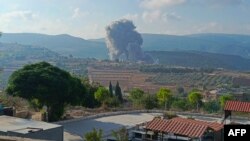Tensions heightened in the Middle East Sunday with Israel and Hezbollah militants in Lebanon launching hundreds of strikes against each other and then, as the barrage seemingly ended, vowed to continue the fight.
"We are striking Hezbollah with surprising, crushing blows,” Israeli Prime Minister Benjamin Netanyahu told a Cabinet meeting. “This is another step towards changing the situation in the north and safely returning our residents to their homes. And, I repeat, this is not the final word.”
Hezbollah described its return attacks against Israel as the first stage of retaliatory strikes for the Israeli assassination last month in Beirut of Fouad Shukur, a Hezbollah commander Israel blamed for an attack that killed 12 children and teenagers on a football field. Hezbollah said new attacks would target sites deeper into Israel but that “military operations for today have been completed."
The Israeli and Hezbollah attacks did not appear to ignite a broader Mideast war, but old issues remained unresolved. In Cairo on Sunday, Egypt was hosting new high-level negotiations to try to reach a cease-fire between Israel and Hamas militants to end more than 10 months of fighting in Gaza and an agreement on the release of 100 or so hostages Hamas is holding. The cease-fire talks have been stalemated for months.
In the Sunday fighting, Israel said it launched a wave of airstrikes across southern Lebanon in what it called a preemptive strike on Hezbollah. The Lebanese militant group then said it fired hundreds of rockets and drones in retaliation for Shukur’s killing.
As the barrage of attacks appeared to end by mid-morning, three people had been killed in Lebanon but none in Israel.
Netanyahu said the Israeli military destroyed thousands of "short-range rockets, all of which were intended to harm our civilians and forces in the Galilee."
"Additionally, the [Israel Defense Forces] intercepted all the drones that Hezbollah launched at a strategic target in central Israel," which Israeli media identified as the headquarters of the Israeli Mossad spy agency near Tel Aviv.
Netanyahu, speaking at the start of the Cabinet meeting, said the military had eliminated "thousands of rockets that were aimed at northern Israel" and urged citizens to adhere to directives from the Home Front Command.
"We are determined to do everything to defend our country, to return the residents of the north securely to their homes and to continue upholding a simple rule: Whoever harms us — we will harm them," he said.
Air raid sirens were reported throughout northern Israel, and Israel's Ben-Gurion International Airport closed and diverted flights for about an hour due to the threat of attack. Israel's Home Front Command raised the alert level in northern Israel and encouraged people to stay near bomb shelters.
Lt. Col. Nadav Shoshani, an Israeli military spokesperson, said Hezbollah had intended to hit targets in northern and central Israel. He said initial assessments found "very little damage" in Israel, but that the military remained on high alert. He said around 100 Israeli aircraft took part in Sunday's strikes.
Lebanon's Health Ministry reported that two people were killed and another two wounded in the strikes in southern Lebanon. Separately, a fighter for the Amal group, which is allied with Hezbollah, was killed in a strike on a car, Amal said.
Hezbollah said its attack involved more than 320 Katyusha rockets aimed at multiple sites in Israel and a "large number" of drones. It said the operation was targeting "a qualitative Israeli military target that will be announced later" as well as "enemy sites and barracks and Iron Dome [missile defense] platforms."
Randa Slim, a senior fellow at the Washington-based Middle East Institute, said Sunday morning's exchange was "still within the rules of engagement and unlikely at this point to lead to an all-out war."
In the U.S., deputy spokesperson for the National Security Council, Sean Savett, said President Joe Biden was "closely monitoring events in Israel and Lebanon."
"At his direction, senior U.S. officials have been communicating continuously with their Israeli counterparts," Savett said. "We will keep supporting Israel's right to defend itself, and we will keep working for regional stability."
The Pentagon said Defense Secretary Lloyd Austin spoke with his Israeli counterpart, Yoav Gallant, about Israel's defenses. The chairman of the Joint Chiefs of Staff, Gen. CQ Brown, is on a visit to the region that is expected to take him to Israel, Egypt and Jordan.
Some material in this report came from The Associated Press and Agence France-Presse.





Forum